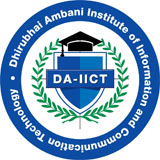Dhirubhai Ambani Institute of Information and Communication Technology, Gandhinagar
- PG Admissions 2023 Announced
- | Ph.D. Admissions 2023 Announced
- | Admission Helpline - Voice call: 080 66 91 91 80
- M.Tech. (EC) - last date 28th April 2022
- Admission Helpline - Voice call: 080 66 91 91 80
- UG Admissions - All India Category - Admission Status Announced
Gangeya Mukherji

Contact Details
Biography
Gangeya Mukherji took his doctorate degree from the University of Allahabad, on Vivekananda and Tagore, subsequent to the award of a Junior Research Fellowship from the University Grants Commission of India. He taught English Literature at a liberal arts college for 32 years before opting for early retirement in 2021. He was a Fellow at the Indian Institute of Advanced Study, Shimla (2008-2010), and Sabarmati Ashram Preservation and Memorial Trust (May-June 2017); and a Visiting Professor at the School of Arts and Sciences, Ahmedabad University (2018). Interested in the history of ideas with a particular focus on nineteenth and twentieth-century India, Mukherji specialises in Intellectual history, with a particular focus on capacious concepts, the imagining of modern India, Vivekananda, Tagore, Gandhi, Post Colonialism, and the Mahabharata. His books, published internationally, have been credited with generous reviews by some of the leading experts in the field. He served as the Convener of the International Seminar on “Exploring NonViolence” organised at the Indian Institute of Advanced Study, Shimla, from October 20-22, 2008; the International Seminar on “The Home and the World: Rabindranath Tagore” sponsored by Ministry of Culture, Government of India, and organised at the Indian Institute of Advanced Study, Shimla, during November 14-16, 2011, the Joint Coordinator of the Summer School on “Exploring Agency in the Mahabharata: Ethical, Political and Dharmic” organised at the Indian Institute of Advanced Study, Shimla, during September 17-30, 2012, and the Coordinator of the Winter School on “Life and Thought of Gandhi” organised at the Indian Institute of Advanced Study, Shimla, from December 1-15, 2016.
Specialization
Intellectual history, 19th century India, Post-colonialism, Vivekananda, Tagore, Gandhi, Mahabharata.
Publications
Books
- Gandhi and Tagore: Politics, Truth, and Conscience, Oxon; Delhi: Routledge, 2016.
- An Alternative Idea of India: Tagore and Vivekananda, London; Delhi: Routledge, 2011.
Edited Volumes
- Learning Non-Violence, Delhi: Oxford University Press, 2016.
- Exploring Agency in the Mahabharata: Ethical and Political Dimensions of Dharma, co-edited with Sibesh Chandra Bhattacharya & Vrinda Dalmiya, Oxon; Delhi: Routledge, 2018.
Contributions to Volumes
- ‘The Schema of the Vow: Individuality and Dharma in Mahabharata’ in Indian Ethics and the Human Condition -- In Search of Answers, Kolkata: Ramakrishna Mission Institute of Culture (forthcoming).
- ‘Yakshaprasna and Yudhishthira: A Conversation on Dharma and Ethics’, in Balaganapathi Deverakonda, et al., (eds), Dialoguing with Timeless Text: Revisiting the Mahabharata, Delhi: Motilal Banarasidass Publishing House (forthcoming).
- ‘Gandhi: Calling to non-violence joined by a strong pragmatism’, in Rajeev Bhargava (ed), Politics, Ethics and the Self: Re-reading Gandhi’s Hind Swaraj, Oxon; Delhi: Routledge, 2022.
- Entry on ‘Ahimsa / Himsa / Satya / Asatya / Shanti', in Peter Ronald deSouza & Rukmini Bhaya Nair (eds), Indian Keywords Lexicon, London: Bloomsbury UK, 2020.
- ‘Complexities in the Agency for Violence: A Look at the Mahabharata’ in Sibesh Chandra Bhattacharya, Vrinda Dalmiya & Gangeya Mukherji (eds), Exploring Agency in the Mahabharata: Ethical and Political Dimensions of Dharma, Oxon; Delhi: Routledge, 2018.
- ‘Introduction: To Do’ with Vrinda Dalmiya in Sibesh Chandra Bhattacharya, Vrinda Dalmiya & Gangeya Mukherji (eds), Exploring Agency in the Mahabharata: Ethical and Political Dimensions of Dharma, Oxon; Delhi: Routledge, 2018.
- ‘Introduction’ in Gangeya Mukherji (ed.), Learning Non-Violence, Delhi: Oxford University Press, 2016.
- ‘Himsa-Ahimsa in the Mahabharata: The Lonely Position of Yudhishthira’ in Arindam Chakrabarti and Sibaji Bandyopadhyay (eds), Mahabharata Now: Narration, Aesthetics, Ethics, London; Delhi: Routledge, 2014.
- ‘Reading King Lear: The Evil of Lying and the Perception of Truth’, in Shormistha Panja (ed.), Shakespeare and the Art of Lying, Delhi: Orient BlackSwan, 2013.
- ‘Nehru and Later’, in Neelum Saran Gour (ed.), Allahabad: Where the Rivers Meet, Mumbai: Marg Publications, Vol. 61 No. 1, September 2009.
- ‘Tagore as Public Intellectual’, in Shreesh Chaudhury et al (eds.), Reflections On English Studies: Essays In Memory of Shankarnand Palit, Darbhanga: Panchjanya Trust Pindarauch, 2009.
Ongoing and Future Projects
- Fifteen thousand-word essay entitled, "Each One’s Gandhi: Critiquing, Enlisting, or Recording Gandhi’s Life" [manuscript ID ENGHIS-2025-ART-089] submitted for consideration to The English Historical Review. Oxford: Oxford University Press. Peer Review report awaited.
- A selection of the writings of Mahatma Gandhi, comprising 500 pages and entitled Gandhi: A Contemporary Reader. The reader is broadly patterned on the two-volume, Essential Writings of Jawaharlal Nehru edited by S Gopal & Uma Iyengar. The manuscript is currently being finalised for Routledge.
- Monograph on the biographies of Gandhi. The manuscript is expected to be complete by June 2028.
- Monograph on Gandhi and the Bhagavadgita. Likely to be titled Gandhi’s Gospel, and expected to be completed by June 2027, around the centenary of Gandhi’s discourses on the Gita in the Satyagraha Ashram.
- Monograph on Yudhishthira and Dharma in the Mahabharata, likely to be completed by December 2030.
Papers
- ‘Behind Tagore’s Response to the Poona Pact: Memory. Allegiance. Anxiety’, The Journal of Hindu Studies, Oxford: Oxford University Press. https://doi.org/10.1093/jhs/hiaf004
- ‘Bhagavad Gita in Modern India’ with Sanjay Palshikar, Oxford Bibliographies in Hinduism. Ed. Tracy Coleman. New York: Oxford University Press, 2019; Rev., 2025; URL:https://www.oxfordbibliographies.com/display/document/obo-9780195399318/obo-9780195399318-0229.xml?rskey=FxiPe6&result=26
- ‘Gandhi: The Recognition of Political Temptation’, IIC Quarterly, New Delhi: India International Centre, vol. 46 Autumn 2019, Number 2, pp. 127-37.
- ‘Vivekananda: The ethics of responsibility and the imagining of Modern India’, Occasional Paper: History and Society, New Series, 52, New Delhi: Nehru Memorial Museum and Library, 2014.
- ‘Thinking Community and Nation: Relevance of Vivekananda’, IIC Quarterly, New Delhi: India International Centre, Summer 2012, vol. 39, Number 1, pp. 20-29.
- ‘Open Texture of Nationalism: Tagore as Nationalist’, Rupkatha Journal: On Interdisciplinary Studies, [An Online open-access E-Journal, http://www. rupkatha.com/.]; Special issue on Rabindranath Tagore, 150 Years, vol. 2, no. 4, November 2010, pp. 373-384.
- ‘Gandhi: Non-Violence and Pragmatism’, Studies in Humanities and Social Sciences, Shimla: Indian Institute of Advanced Study, vol. XVI, nos. 1 & 2, 2009, pp. 95-117.
- ‘Exploring NonViolence: A Seminar Report’, Economic & Political Weekly, Mumbai: Sameeksha Trust, vol. XLIV, no. 24, June 13-19, 2009, pp. 23-25.
- ‘Tagore in the Context of Postcolonialism’, Sandhan, New Delhi: Centre for Studies In Civilizations, vol. VIII, no. 1 Jan-June 2008, pp. 27-93.
- ‘Tagore: Transcending Post Colonial Attitudes’, Studies in Humanities and Social Sciences, Shimla: Indian Institute of Advanced Study, vol. XII, no. 2, Winter 2005, pp. 75-95.
- ‘The Myriad Voices of the Indian Renaissance: Transmutation of the Regional to the Universal’, Studies in Humanities and Social Sciences, Shimla: Indian Institute of Advanced Study, vol. XI, no. 1, Summer 2004, pp. 93-120.
- ‘A Philosophy for Disarmament?’, Seminar, New Delhi: Rameshraj Trust, 532 – December 2003.
- ‘Synthesizing Modernity & Tradition: The Relevance of Vivekananda’, Studies in Humanities and Social Sciences, Shimla: Indian Institute of Advanced Study, vol. VII, no. 2, 2000, pp. 83-107.
- ‘Modern Indian Education and Human Values’, Mainstream, New Delhi: Perspective Publications Private Ltd., Annual, December 23, 2000, pp. 97-102.
- ‘Vivekananda at the Time of Break-up of Nations’, Mainstream, New Delhi: Perspective Publications Private Ltd., Republic Day Special, vol. XXXVIII, no. 6, Jan 29, 2000, pp. 37-40.
Book reviews
- Gandhi: The End of Non-Violence,Manash Firaq Bhattacharjee, Gurugram: Vintage, 2025, in Biblio: A Review of Books, New Delhi, Vol. 30, Nos. 7-9, July-September, 2025, p. 8. (forthcoming)
- Gandhi Turned Out to be “A True Mother and Father Combined”. CORRESPONDENCE BETWEEN GANDHI AND NILLA CRAM COOK: A YOUNG AMERICAN WOMAN IN INDIA, 1932-33, Ed. & Intro, E.S. Reddy, Ahmedabad: Navjivan Publishing House, 2024, in The India Forum, July 2024. URL: https://www.theindiaforum.in/book-reviews/gandhis-american-disciple
- Elusive Non-Violence: The Making and Unmaking of Gandhi’s Religion of Ahimsa, by Jyotirmaya Sharma, Chennai: Context, 2021, in Biblio: A Review of Books, New Delhi, Vol. 27, Nos. 1-3, March-January, 2022, p. 16.
- M.K. Gandhi, An Autobiography or The Story of My Experiments with Truth, Critical Edition, Introduced with Notes by Tridip Suhrud,New Delhi: Penguin Books, 2018, in Seminar, New Delhi: Rameshraj Trust, 710 – October 2018, pp. 91-92.
- Two Saints: Speculations Around and About Ramakrishna Paramhamsa and Ramana Maharshi, by Arun Shourie,New Delhi: HarperCollins Publishers India, 2017, in Biblio: A Review of Books, New Delhi, Vol. XXXIII, Nos. 1-3, March-January, 2018, p. 30.
- The Decline of Civilization: Why We Need To Return To Gandhi and Tagore, by Ramin Jahanbegloo, New Delhi: Aleph Book Company, 2017, in Seminar, New Delhi: Rameshraj Trust, 702 – February 2018, pp. 72-73.
- Gandhi: An Impossible Possibility, by Sudhir Chandra, (trans) Chitra Padmanabhan,London: Routledge, 2017, in The Hindu, Chennai, 28 May 2017, p. 16.
- An Idealist in India: Selected Writings and Speeches of Sister Nivedita, by Amiya P. Sen,New Delhi: Primus Books, 2016, in The Book Review,New Delhi: The Book Review Literary Trust, Vol. XLI, No: 3, March 2017, pp. 15-16.
- Evil and the Philosophies of Retribution: Modern Commentaries on the Bhagavad-Gita, by Sanjay Palshikar, Delhi: Routledge, 2014, in Seminar, New Delhi: Rameshraj Trust, 662 –October 2014, pp. 79-82.
- Mahatma Gandhi, Indian Home Rule [Hind Swaraj]: A Centenary Edition with an Introduction by S. R. Mehrotra, New Delhi & Chicago: Promilla & Co., Publishers in association with Bibliophile South Asia, 2010, in Summerhill: IIAS Review, Shimla: Indian Institute of Advanced Study, vol. XVI, No. 1, (Summer 2010), pp. 85-86.
Commissioned papers
- ‘Statement of Outstanding Universal Value and Justification of Criteria’ as Consultant for the team preparing the Dossier for the Ministry of Culture, Government of India, for the nomination of Santiniketan as a UNESCO World Heritage Site in 2009.
- ‘South Asian Philosophies of Peace: Tagore and Vivekananda’, as part of syllabi for the Nelson Mandela Center for Peace and Conflict Resolution, Jamia Millia Islamia, Delhi, 2009.

